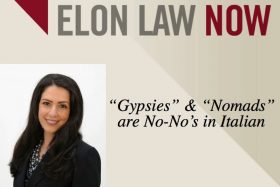Elon Law Professor Antonette Barilla examines developing responses to migration flows and itinerant groups in Italy, in this week’s “Elon Law Now” series of faculty commentary.

“Matteo Salvini, the leader of Italy’s far right political party, Lega Nord, was temporarily restricted from his personal Facebook account this week for using the word ‘zingari’ (gypsies). This follows a decree issued last year by the mayor of Rome barring the use of the word ‘nomadi’ (nomad) in city hall in an effort to address discrimination against the Roma community. He suggested the word ‘travelers’ might more objectively describe this distinctive population.
“Italy, a country roughly the size of California, receives more refugees by sea than any other nation on the continent. And while the hundreds of thousands arriving each year, primarily from North Africa and the Middle East, inspire frequent headlines, it’s the tens of thousands of resident ‘travelers’ that befuddle the country’s leaders.
“The Roma (not to be mistaken for Romans) are of Indo-Aryan origin and are the oldest itinerant group in Europe. It is the roving element inherent in their culture that has inspired descriptors such as ‘gypsy’ and ‘nomad.’ But things are changing. With over forty thousand Roma living in government run camps, and a growing population born and raised on Italian soil, many Roma advocate for greater integration into the Italian community, and empathetic leaders are beginning to listen – limiting acceptable adjectives in an effort to change the way in which Italians regard these inhabitants.
“Mirroring the plight of other populations that seek a homeland, and serving as examples of the complex issues that migrant and refugee peoples carry with them, the recent restrictions on how Italians describe the Roma remind us that the way in which we think and speak about people can set the tone for how people behave toward them.
“In a staff memo that was published in Il Messaggero, a Rome-based Italian newspaper, Mayor Ignazio Marino encouraged the creation of policies that fostered integration – one of which was no longer referring to the Roma, Sinti and other itinerant communities as nomads. ‘I think it [the language we use] is one of the key factors in overcoming discrimination,” he said. “I hope that, through this simple change in terminology, it reflects that the city council caters to all people living within its territory.’
“The recent Facebook issue highlights the contradictory duality of Italian politics versus Italian cultural and social practices. While Italian officials and policymakers continue to wrangle linguistic nuances, the essence of the social tensions concerning the Roma in Italy will remain effectively lost in translation.”
Antonette Barilla is director of academic and bar support and assistant professor of law at Elon. Fluent in English, Italian and Spanish, Barilla is an alumnus of the University of London, where she obtained her Postgraduate Certificate in Law with specialization in Law and Development, her Postgraduate Diploma in Laws with specialization in International Business Law and finally her LLM. She is an alumnus of California Polytechnic University, Pomona, Western State College of Law and The Hague Academy of International Law. More information about Barilla is available here.
“Elon Law Now” is a weekly series of commentary and analysis about current legal news by members of the faculty at Elon Law. Prior “Elon Law Now” commentary is available here.


